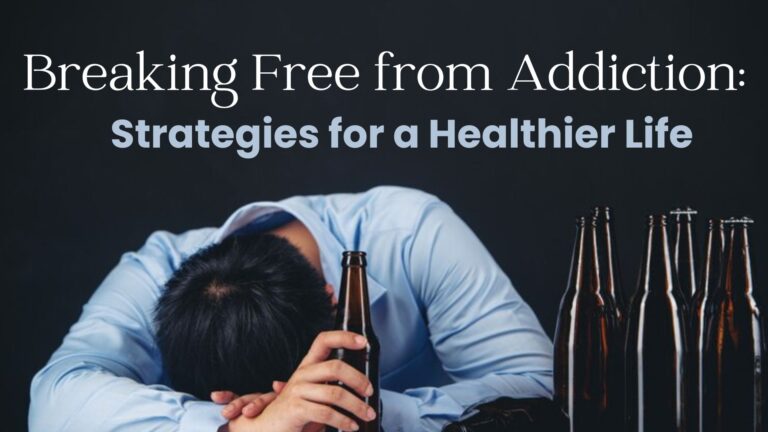Addiction is a complex and challenging issue that affects millions of people worldwide. Whether it’s alcohol, drugs, or other substances, breaking free from addiction requires a comprehensive approach that addresses both the physical and psychological aspects of the condition. In this blog, we will explore effective strategies for overcoming addiction and reclaiming a healthier, more fulfilling life.
1. Acknowledge the Problem
The first step towards recovery is acknowledging the presence of an addiction. It’s essential to recognize the impact that substance use is having on your life, including your health, relationships, and overall well-being. This awareness is the foundation for making positive changes and seeking help.
2. Seek Professional Help
Professional support is crucial in the journey to overcoming addiction. Healthcare providers, therapists, and addiction specialists can offer personalized treatment plans that include counseling, medication, and support groups. These resources provide the necessary guidance and tools to help you navigate the recovery process effectively.
3. Consider Nutritional Support
Nutritional support can play a role in addiction recovery. Certain supplements, such as Addiction Killer powder, are designed to help manage cravings and support the body’s detoxification process. While supplements alone are not a cure, they can be a helpful addition to a comprehensive recovery plan that includes medical and psychological support.
4. Develop a Support System
Building a strong support system is vital for long-term recovery. Surround yourself with supportive family members, friends, and peers who understand your struggles and are willing to help you stay on track. Support groups, whether in-person or online, can also be invaluable for connecting with others who are going through similar experiences.
5. Adopt Healthy Coping Mechanisms
One of the keys to overcoming addiction is finding healthy ways to cope with stress and triggers. Activities such as exercise, meditation, and creative hobbies can provide positive outlets for emotions and help reduce the urge to use substances. These activities also promote mental and physical well-being, which are essential components of a successful recovery.
6. Understand the Risks of Alcoholic Hepatitis
For those struggling with alcohol addiction, it’s important to be aware of the risks of Alcoholic Hepatitis, a serious liver condition caused by excessive alcohol consumption. Understanding the potential health consequences of continued substance use can serve as a strong motivator to seek treatment and make lasting changes.
7. Set Realistic Goals
Setting realistic and achievable goals is an essential part of the recovery process. Break down your recovery journey into manageable steps, such as reducing substance use gradually, attending regular therapy sessions, or maintaining sobriety milestones. Celebrate each accomplishment, no matter how small, as it reinforces your commitment to recovery.
8. Embrace Lifestyle Changes
Long-term recovery often involves making significant lifestyle changes. This may include altering your environment, avoiding places or situations that trigger cravings, and adopting new routines that support a substance-free life. Embracing these changes is key to maintaining sobriety and preventing relapse.
9. Practice Patience and Self-Compassion
Recovery is a journey, not a destination. It’s important to be patient with yourself and recognize that setbacks may occur. Instead of being discouraged, view these moments as opportunities to learn and grow. Practicing self-compassion and forgiveness can help you stay focused on your long-term recovery goals.
10. Stay Committed to Your Health
Ultimately, overcoming addiction is about committing to a healthier and more fulfilling life. This commitment requires ongoing effort, but the rewards are immeasurable. By focusing on your health, well-being, and personal growth, you can break free from the chains of addiction and build a brighter future.
In conclusion
Breaking free from addiction requires a comprehensive approach that includes professional support, healthy coping mechanisms, and a strong commitment to change. By incorporating strategies like nutritional support with Addiction Killer powder and being aware of the risks associated with Alcoholic Hepatitis, you can take meaningful steps towards recovery. Remember, the journey may be challenging, but the outcome is a healthier, happier life free from addiction.




